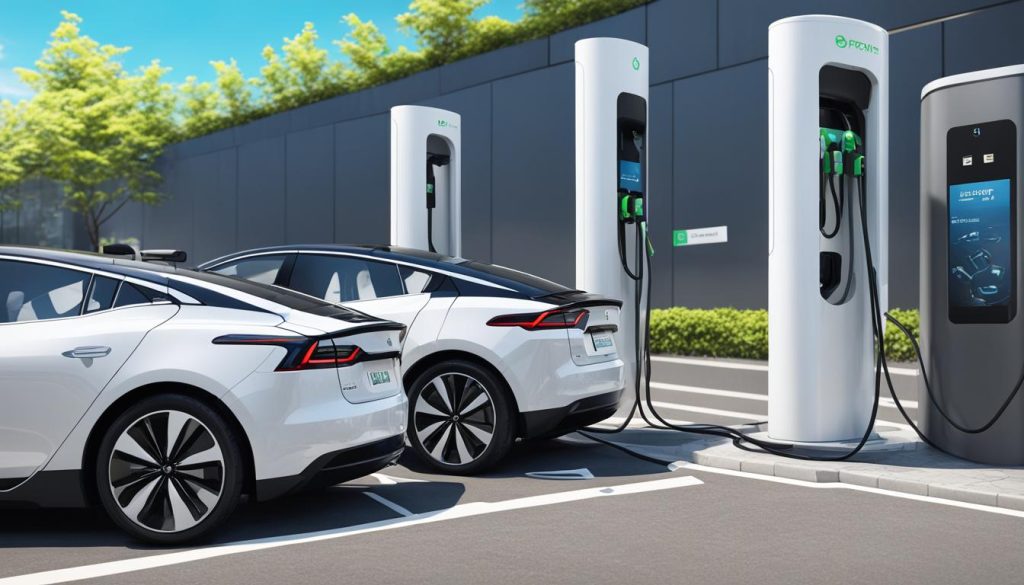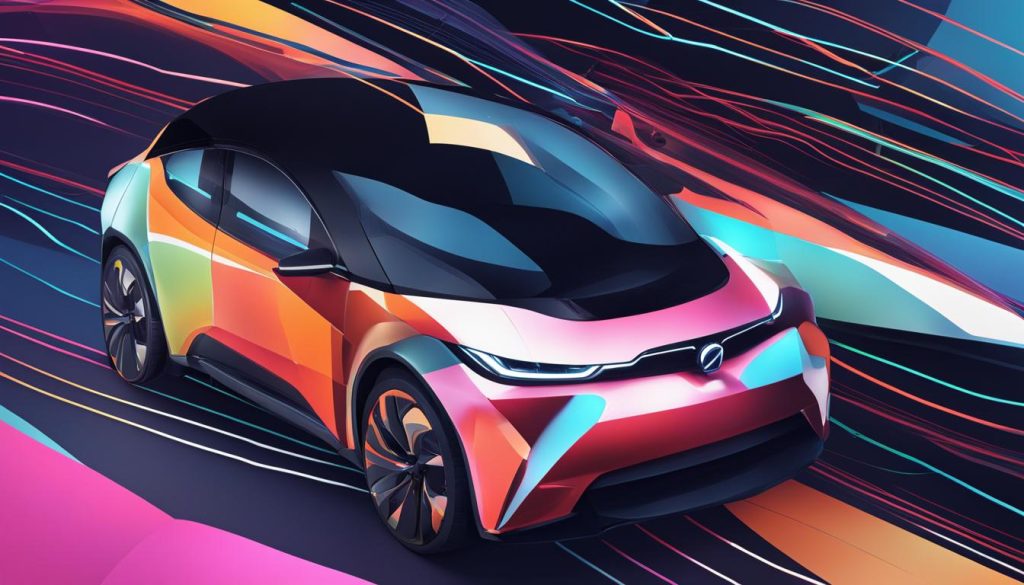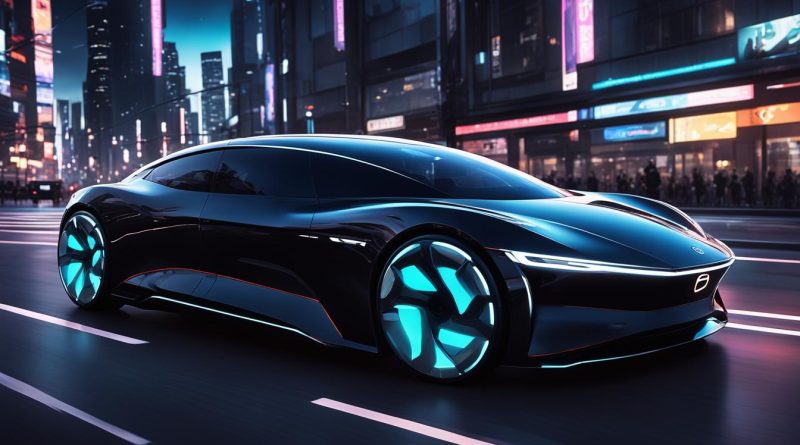Ultimate Electric Car Buyer’s Guide
Electric cars, also known as electric vehicles (EVs), are becoming increasingly popular as people seek more environmentally-friendly and cost-effective modes of transportation. If you’re considering purchasing an electric car, it’s important to understand the technology behind them, the benefits of ownership, and the market trends of the industry.
In this comprehensive guide, we will cover all aspects of electric vehicle ownership, from the basics of electric car technology to the current market trends. By the end of this guide, you will have a clear understanding of what to consider when purchasing an electric car.
Key Takeaways
- Electric cars provide a more environmentally-friendly mode of transportation
- Understanding the technology behind electric cars is important before purchasing
- Financial advantages and government incentives make electric car ownership appealing
- There are a variety of electric car models available from leading manufacturers
- Electric car ownership is on the rise and will continue to grow
Understanding Electric Car Technology
Electric car technology has evolved significantly over the years, making them a viable alternative to traditional petrol and diesel vehicles. Understanding the technology behind electric cars is essential to appreciate their benefits fully.
Battery Technology
The battery is the heart of an electric car, and advancements in battery technology have greatly influenced the production and usage of electric vehicles. Modern electric car batteries have a higher energy density, resulting in longer driving ranges and faster charging times. The latest batteries can also store more energy, and this has made them more affordable and accessible in recent years.

Charging Infrastructure
The development of a robust charging infrastructure is essential to promote the wider adoption of electric cars. Public charging points must be strategically located in urban areas to ensure that drivers can access them conveniently. The installation of home chargers is also crucial, as it gives car owners more flexibility when it comes to charging their vehicles regularly.
Electric Car Range
One of the most significant considerations when purchasing an electric car is their range. Driving range is determined by several factors that include weather conditions, driving style, and terrain. The latest electric vehicles can travel up to 300 miles on a full charge, and the range continues to improve with the development of newer batteries and charging infrastructure.
Exploring the Benefits and Market Trends of Electric Cars
Electric cars have numerous benefits that make them a compelling option for car buyers. They not only reduce harmful emissions and help combat climate change but also save money in the long run. In this section, we will dive deep into the advantages and current market trends surrounding electric cars.
Financial Advantages of Electric Car Ownership
One of the most significant reasons people choose electric cars over traditional gasoline vehicles is financial savings. While electric car prices have historically been higher, the gap is narrowing. Currently, electric cars have lower running costs than traditional cars and require less maintenance. Charging an electric car is also cheaper than refueling a gasoline car. Over the lifetime of the car, drivers can save thousands on fuel and maintenance costs.
Environmental Impact of Electric Cars
Electric cars have a lower environmental impact than traditional gasoline cars. By using electricity instead of gasoline, electric cars significantly reduce harmful emissions. Additionally, electric cars operate more efficiently than their gasoline counterparts, resulting in less wasted energy. Choosing an electric car is a simple and effective way to decrease your carbon footprint and help combat climate change.
Government Incentives for Electric Car Ownership
Many governments around the world offer incentives for electric car ownership in an effort to promote sustainable practices and reduce harmful emissions. These incentives can include tax credits, rebates, and reduced vehicle registration fees. If you are considering purchasing an electric car, check with your local government to see if you are eligible for any incentives.
Current Market Trends in Electric Cars
The electric car market is rapidly growing, with more manufacturers jumping on board each year. Currently, the most popular electric car manufacturers include Tesla, Nissan, and BMW. However, many other car companies like Audi, Ford, and Volkswagen now offer electric models.

| Manufacturer | Electric Models |
|---|---|
| Tesla | Model S, Model 3, Model X, Model Y |
| Nissan | Leaf |
| BMW | i3, iX3, i4 |
| Audi | e-tron, e-tron Sportback |
| Ford | Mustang Mach-E |
| Volkswagen | ID.3, ID.4 |
The variety of electric car models is constantly expanding, with options ranging from luxury to budget-friendly. Additionally, advancements in battery technology are making electric cars more accessible and convenient for daily use. As the market grows and technology advances, the future of electric cars looks bright.
Conclusion
In conclusion, buying an electric car is a smart investment that brings numerous benefits to the owner and the environment. This guide has provided a detailed overview of the technology behind electric cars, the importance of a robust charging infrastructure and the factors that affect an electric car’s range.
Moreover, the guide explored the financial advantages, environmental impact, and government incentives associated with electric car ownership. This information will empower potential electric car buyers to make an informed decision when purchasing an electric car.
With a variety of electric car models available in the market and leading manufacturers investing in electric car technology, the road ahead looks bright for electric cars. Don’t hesitate to join the electric car revolution and embrace the future of transportation by purchasing an electric car today.
FAQ
What is an electric car?
An electric car, also known as an electric vehicle (EV), is a vehicle that operates using one or more electric motors powered by rechargeable batteries. Unlike traditional internal combustion engine cars, electric cars produce zero tailpipe emissions and rely on electricity as their primary source of power.
How does an electric car work?
Electric cars work by storing electricity in advanced lithium-ion batteries. When the driver activates the electric motor, electricity is drawn from the batteries and used to power the motor, which, in turn, drives the wheels. To recharge the batteries, electric cars can be plugged into a charging station or a standard electrical outlet.
What are the benefits of owning an electric car?
There are several benefits to owning an electric car. They produce zero tailpipe emissions, reducing air pollution and greenhouse gas emissions. Electric cars also tend to have lower operating costs compared to traditional gas-powered vehicles. Additionally, electric car owners can often take advantage of government incentives and tax credits.
What is the range of an electric car?
The range of an electric car refers to the maximum distance it can travel on a single charge. Electric car ranges vary depending on the make and model, with some vehicles offering ranges of over 300 miles on a full charge. However, it’s important to note that factors such as driving conditions, temperature, and speed can affect the actual range achieved.
What is the charging infrastructure like for electric cars?
The charging infrastructure for electric cars is steadily growing and evolving. There are various types of charging stations, including Level 1, Level 2, and DC Fast Charging stations. Level 1 chargers can be plugged into a standard electrical outlet and provide a slower charging speed, while Level 2 chargers require a dedicated charging unit and deliver faster charging times. DC Fast Charging stations offer the quickest charging times and are typically found along highways and major routes for long-distance travel.
Are electric cars expensive?
The cost of electric cars can vary depending on the make, model, and features. Generally, electric cars tend to have a higher upfront cost compared to traditional gas-powered vehicles. However, lower operating costs, potential tax credits, and fuel savings over time can help offset this initial cost. Additionally, as the electric car market continues to grow, prices are becoming more competitive.
What is the current market like for electric cars?
The market for electric cars is expanding rapidly as more manufacturers introduce new models and governments implement policies and incentives to promote electric vehicle adoption. Leading manufacturers such as Tesla, Nissan, Chevrolet, and BMW offer a range of electric car options. As the technology continues to evolve and the charging infrastructure improves, the electric car market is expected to grow even further.




